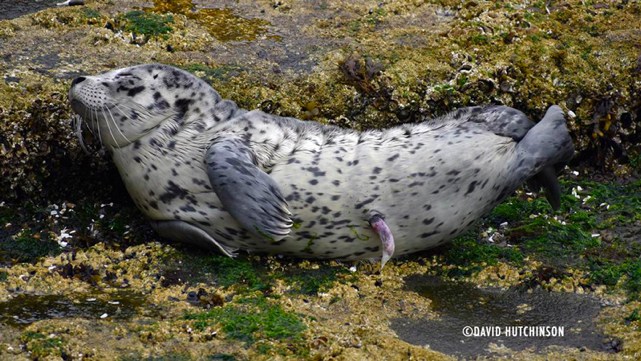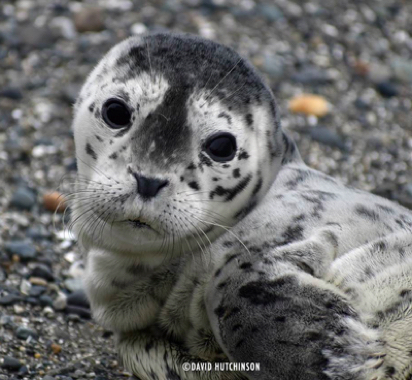Newborn seal pup taken to rehab
Jul/25/20 01:04 PM

First Responder Jay immediately headed to the site, armed with stranding materials if necessary to keep people back. Upon arrival, he saw a short stub of umbilical cord on the alert pup’s belly. He notified other responders that we had a newborn seal on our urban beach - a scenario that often has a bad outcome. Abandonment is much more likely when people or dogs cause disturbance and frighten a mom away. If a mom has not bonded with her newborn or fears for her own safety, she may not return to nurse the pup, who cannot survive without her.
For the past 5 months, NOAA’s Marine Mammal Stranding Networks have been trying to determine how to respond to and protect animals while abiding with safety considerations and distancing mandates in these COVID times. Seal Sitters’ response area has miles of urban shoreline, almost all accessible to the public for recreation purposes. During this difficult time, our responders have been deliberating the logistics of giving seal pups the protection and rest they need, yet keeping our volunteers and the public safe - all the while trying to keep people at a distance, not only from the pup, but also from each other and discourage assembly. A heady challenge.
That challenge was put to the test Wednesday morning. A quick perimeter of yellow tape emblazoned with “Share the Shore” was established on the sidewalk above the pup and cones were placed on the beach. Fearing that the pup might already have been abandoned, a call was placed to PAWS Wildlife Center to see if they had an open space to accept the pup if necessary. The answer was yes. A second call was made to SR3, a valued non-profit which provides support to the stranding networks. Arrangements were made for their vet to do an on-site visual evaluation of the tiny seal. Based on the length and color of the umbilical cord, the pup was likely only a day old.
Since the seal was alert and assessed to be in relatively good body condition, the decision was made to maintain a low-key volunteer presence to ensure her safety onshore, in hopes the mom might return sometime during the day - or, more likely, in the evening when human activity had quieted down. A pup’s best chance for survival is always with mom. While rehab can fatten up a pup in a small pool, robust enough to be released back into the wild, it cannot teach a pup life skills and how to hunt in the vast waters of Puget Sound. The plan was to capture the pup for transport if the pup’s health declined during the day or if she was still onshore the next morning.

At 5pm, with an ever-encroaching return tide, Echo was forced into the cold waters of Puget Sound. She paddled along the edge the sea wall, trying several times to haul out again, but finally gave up and swam straight out, away from the beach.
Later, she came ashore right in front of the Alki Bathhouse. Resting only briefly after having struggled in the surf, the incoming waves swept over her once more and the exhausted pup again took off. Volunteers scanned the waves, but here was no sign of an adult seal waiting anywhere offshore.
Shortly after 8pm, the hotline received a frantic report that people were throwing rocks at a pup at the end of the public promenade. Seal Sitters arrived within minutes and Echo was already swimming west toward private beach, inaccessible to responders because of the high tide. We guessed that she likely ended up in a particular nook just on the other side of a cement bulkhead. We were optimistic that little Echo might find some peace and rest there for the night, but less optimistic that mom was still around to feed her.
Sure enough, early the next morning the homeowner phoned Seal Sitters Hotline (206-905-SEAL) to say that Echo was on his beach. Based on deteriorating body condition, indicative of the absence of an attending mom, the decision was made to take her to rehab. Echo was captured and transported by SR3 to PAWS rehabilitation facility in Lynnwood.
PAWS reports that the female pup weighs almost 20 pounds and is just under 30 inches long. At intake, Echo was thin and dehydrated, but the hope is that she will do well in rehab. Seal Sitters thanks PAWS for giving this stunning silver pup a chance for survival. A heartfelt thanks goes out to SR3 for their field support and to Seal Sitters’ First Responders and volunteers who protected Echo throughout a long, stressful day.







